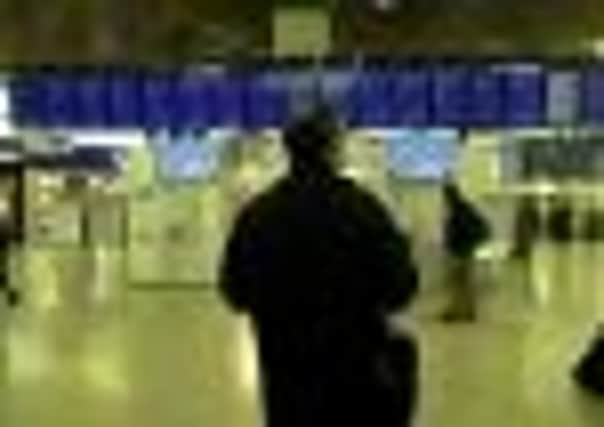Video: As punctuality plummets, your Metro season ticket is going up 8% next month.


Just a day after rail regulators highlighted failings in getting trains to run on time, companies announced that fares would rise on January 2 by an average of 5.9%.
Regulated fares, which include season tickets, will go up by an average of 6%. But in West Yorkshire, they will rise by 8%, and shadow transport secretary Maria Eagle warned that many tickets would increase “by a shocking 9%”.
Advertisement
Hide AdAdvertisement
Hide AdSeason tickets on Northern Rail’s West Yorkshire Metro services will be governed by an inflation-plus-3% formula, which means they will be rising by an average of 8%.


A Leeds to Wakefield season ticket, for example, will be rising 8.09% to £908 on January 2.
A Northampton-London annual season ticket for 2012 will rise 6.92% to £4,756, while a season ticket for travel between London and Tring in Hertfordshire goes up 6.22% to £3,620.
A Swindon-London annual season, already as high as £7.024, will rise 6.03% to £7,488, while season ticket holders in Ramsgate in Kent will find their new year fares also going up 6.03% - to £4,640.
Advertisement
Hide AdAdvertisement
Hide AdCampaign for Better Transport’s (CBT) public transport campaigner Sophie Allain said: “We still have the highest fares in Europe, and they will be around 24% higher by the next election.”
Ms Allain said: “It’s outrageous that the Government is asking commuters in West Yorkshire to pay the highest average rail fare increases in the country.
“Public opinion and political pressure have forced the Government to ease off their original policy of inflation plus 3%, but it seems commuters in West Yorkshire won’t benefit from this change of heart.”
The rises will push a number of commuter towns over the £4,000 mark for a season ticket for the first time, including Bedford (up 5.92% to £4,004), Hastings (up 4.95% to £4,152) and Eastbourne (up 4.97% to £4,136).
Advertisement
Hide AdAdvertisement
Hide AdThe pain for travellers would have been even greater, but Chancellor George Osborne decided last month to reverse a Government decision which would have put regulated fares up by an extra 2% to 8%.
This left regulated fares to go up by RPI plus 1% next month, based on the RPI rate in July this year. However, the Government still plans to bring in regulated fare rises of RPI plus 3% for January 2013 and January 2014.
And the Office of Rail Regulation has warned Network Rail that it is well short of its long-distance punctuality target.
Announcing the fare rises, Michael Roberts, chief executive of the the Association of Train Operating Companies (Atoc) said he understood that a lot of people faced financial difficulties but the industry was looking to limit fare rises “over the longer term”.
Advertisement
Hide AdAdvertisement
Hide AdHe added: “Money raised through fares helps pay for new trains, faster services and better stations.
“The long-standing Government approach to sustaining rail investment is to cut the contribution from taxpayers and increase the share paid for by passengers.”
Ms Eagle bemoaned the fact the Government had scrapped the Labour rule that meant train companies could not raise any fares above the fare cap figure.
She said: “It’s clear that many commuters are facing a fares fiddle thanks to the Government’s decision to allow train companies to average out the revised fare cap across a range of tickets, meaning many tickets will rise by a shocking 9% in the new year.”
Advertisement
Hide AdAdvertisement
Hide AdManuel Cortes, leader of the TSSA transport union, said the train companies were trying to “bury bad news” on the rises by releasing only the barest details of the 5.9% increases.
He said: “Once again we have the private train operators defying all economic logic and increasing the squeeze on passengers during a recession.”
Anthony Smith, chief executive of rail customer watchdog Passenger Focus, said: “Passengers will be relieved that the Government has capped the fares formula at RPI plus 1%, but this will still mean 6% rises, which will not be reflected in most people’s pay.
“The spotlight will really be on train operating companies and Network Rail to deliver on their promises about performance and overcrowding. We passengers are paying our fair share and we want and deserve better.”
Advertisement
Hide AdAdvertisement
Hide AdBob Crow, general secretary of the RMT transport union, said: “These inflation-busting increases show that the great rail fares privatisation swindle is still rocking along, with the train operating companies laughing all the way to the bank.”
A Department for Transport spokesman said the Government “recognises the pressure on family budgets” but added that revenue from fares was “helping to deliver one of the biggest programmes of rail capacity improvements for 100 years”.
Another of the above-average season ticket rises in January will affect commuters from Bishop’s Stortford in Hertfordshire where the increase will be 7.09%.
The Department for Transport pointed out that the Labour decision not to allow companies to raise fares above the fares cap had applied only to the year 2010.
It added that the flexibility arrangement whereby some fares could rise higher than others as long as the average was not exceeded had applied in every other year since the 1990s.